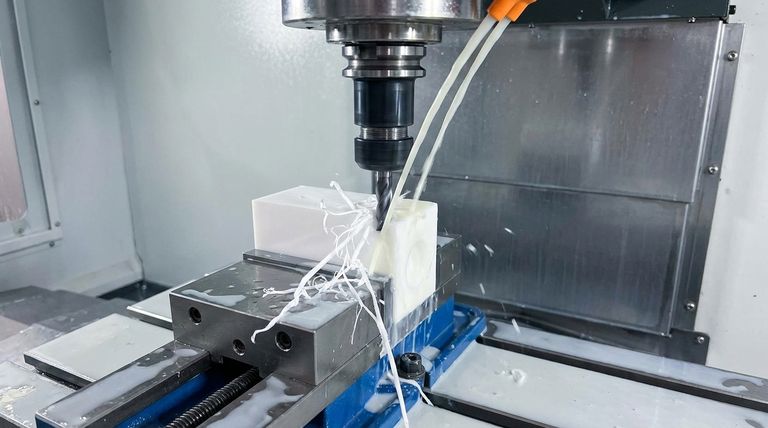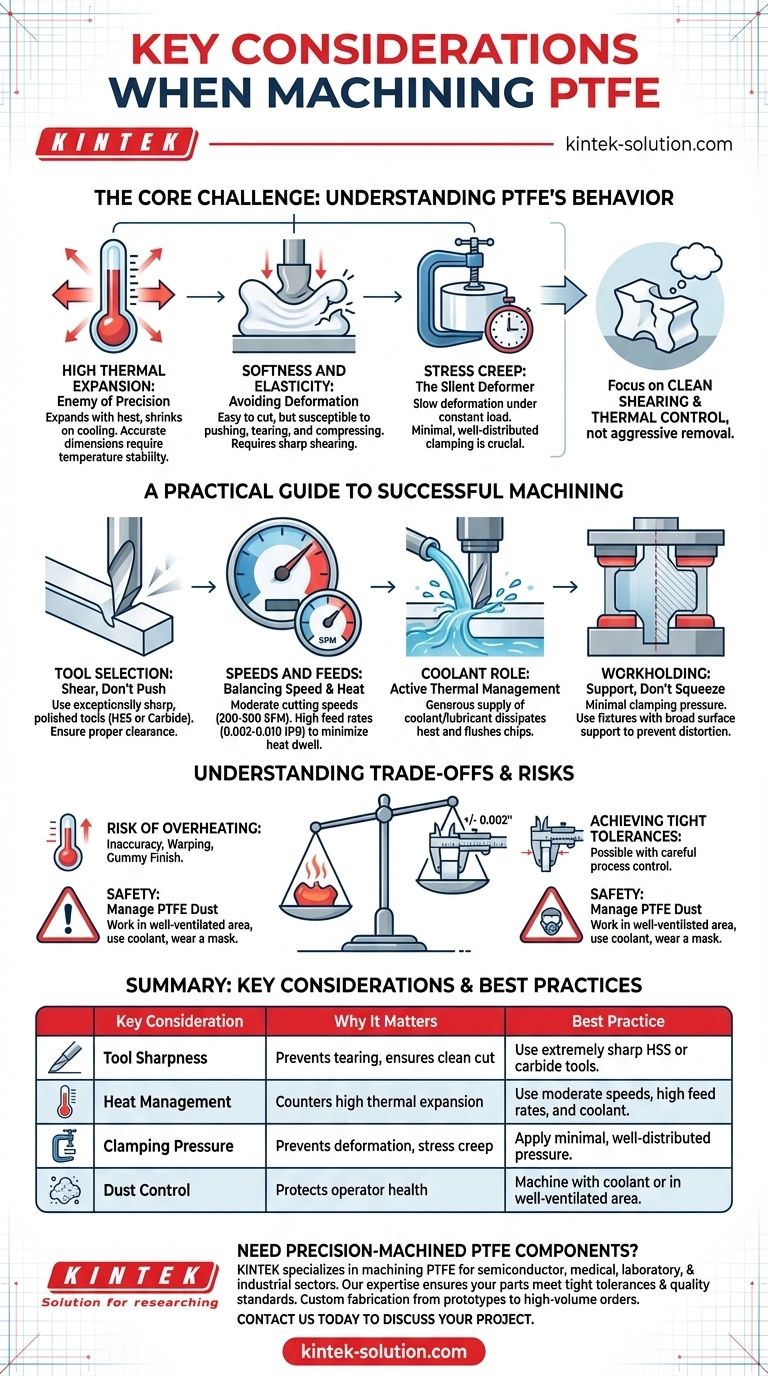To successfully machine PTFE, you must use exceptionally sharp tools, manage heat with moderate cutting speeds and coolant, and apply minimal clamping pressure. These steps are critical for counteracting the material's two most challenging properties: its high rate of thermal expansion and its inherent softness, which make it prone to deformation.
The core challenge of machining PTFE is not its hardness, but its instability. Success depends on respecting the material's tendency to expand with heat and deform under pressure, requiring a strategy focused on clean shearing and thermal control rather than aggressive removal.

The Core Challenge: Understanding PTFE's Behavior
Before a tool ever touches the workpiece, you must understand the properties that make PTFE (Polytetrafluoroethylene) unique. Unlike metals or harder plastics, PTFE's behavior dictates every aspect of the machining process.
High Thermal Expansion: The Enemy of Precision
PTFE has a very high coefficient of thermal expansion. This means it expands significantly when heated and shrinks as it cools.
Even a small amount of heat generated from cutting friction can cause the part to grow. If you machine it to final dimensions while warm, it will be undersized once it returns to room temperature.
Softness and Elasticity: Avoiding Deformation
PTFE is an exceptionally soft material. This makes it easy to cut but also extremely susceptible to being pushed, torn, or compressed rather than sheared cleanly.
Excessive clamping pressure will easily distort the workpiece, leading to inaccurate features. Similarly, a dull cutting edge will plow through the material instead of cutting it, resulting in a poor surface finish and dimensional errors.
Stress Creep: The Silent Deformer
Another key property is stress creep, which is the tendency of PTFE to slowly deform over time when under a constant load.
This reinforces the need for minimal, well-distributed clamping pressure. A part that is tightly clamped may appear accurate on the machine but can become distorted hours or days later as the material settles.
A Practical Guide to Machining PTFE
With a clear understanding of the material's properties, we can establish a practical framework for setting up and running the job successfully.
Tool Selection and Geometry: Shear, Don't Push
The single most important factor is the cutting tool. Your goal is to achieve a clean shearing action.
Use extremely sharp and polished cutting tools. High-Speed Steel (HSS) is often sufficient, but carbide-tipped tools can offer a longer life, especially in production environments. Ensure tools have proper clearance to avoid rubbing.
Speeds and Feeds: Balancing Speed and Heat
The right parameters are designed to remove material efficiently without introducing excessive heat.
Employ moderate cutting speeds (around 200-500 surface feet per minute) combined with high feed rates (0.002 to 0.010 inches per revolution). This approach gets the tool in and out quickly, minimizing dwell time and heat buildup.
The Critical Role of Coolant
Active thermal management is not optional when precision is required.
Always use a generous supply of coolant or lubricant. This serves two vital purposes: it dissipates heat to prevent thermal expansion and it helps flush away the long, stringy chips (swarf) that PTFE produces.
Workholding Strategy: Support Without Squeezing
How you hold the material is as important as how you cut it.
Apply just enough clamping pressure to hold the workpiece securely and no more. Use fixtures that provide broad support across a large surface area to distribute the load and prevent distortion.
Understanding the Trade-offs and Risks
Machining PTFE involves balancing competing factors and being aware of potential failures.
The Risk of Overheating
Failing to manage heat is the most common cause of failure. It leads directly to dimensional inaccuracy, warping, and a "gummy" surface finish as the material approaches its melting point.
Achieving Tight Tolerances
Despite the challenges, skilled machinists can achieve very tight tolerances. With careful process control, holding dimensions within +/- 0.002 inches is entirely possible. This requires constant vigilance and often involves measuring the part after it has cooled.
Health and Safety: Managing PTFE Dust
The fine dust created when machining PTFE can be hazardous if inhaled. This is a critical safety consideration.
Always work in a well-ventilated area, use a coolant to suppress dust, and consider wearing a mask, especially during dry machining operations.
How to Apply This to Your Project
Your specific approach should be tailored to your primary objective for the finished part.
- If your primary focus is maximum dimensional accuracy: Prioritize aggressive cooling and allow the part to stabilize at room temperature before taking final measurements.
- If your primary focus is the best possible surface finish: Use brand new or freshly ground, highly polished cutting tools and maintain a consistently high feed rate.
- If your primary focus is high-volume production: Invest in carbide tooling for longevity and an effective coolant system that can also manage chip evacuation.
Ultimately, machining PTFE is a process of finesse that rewards a deep understanding of the material's unique character.
Summary Table:
| Key Consideration | Why It Matters | Best Practice |
|---|---|---|
| Tool Sharpness | Prevents tearing and ensures a clean cut | Use extremely sharp HSS or carbide tools |
| Heat Management | Counters high thermal expansion | Use moderate speeds, high feed rates, and coolant |
| Clamping Pressure | Prevents deformation from softness and stress creep | Apply minimal, well-distributed pressure |
| Dust Control | Protects operator health | Machine with coolant or in a well-ventilated area |
Need precision-machined PTFE components?
At KINTEK, we specialize in machining PTFE for the semiconductor, medical, laboratory, and industrial sectors. Our expertise in managing material properties like thermal expansion and softness ensures your parts meet the tightest tolerances and highest quality standards.
We offer custom fabrication from prototypes to high-volume orders, delivering the precision and reliability your application demands.
Contact us today to discuss your PTFE project requirements!
Visual Guide

Related Products
- Custom PTFE Parts Manufacturer for Teflon Parts and PTFE Tweezers
- Custom PTFE Parts Manufacturer for Teflon Containers and Components
- Custom PTFE Teflon Balls for Advanced Industrial Applications
- Custom PTFE Sleeves and Hollow Rods for Advanced Applications
- Customizable PTFE Rods for Advanced Industrial Applications
People Also Ask
- Why is CNC machining preferred for Teflon parts over other methods? Unlock Precision & Complex Designs
- What tips can improve Teflon machining results? Master Sharp Tools, Heat Control, and Rigid Support
- How does PTFE contribute to low friction and wear resistance? Achieve Superior Performance with Advanced Materials
- What are the main advantages of using PTFE parts in industrial applications? Unlock Unmatched Chemical Resistance and Reliability
- What are the future considerations for machining Teflon? Mastering Material Challenges with Smart Tech



















